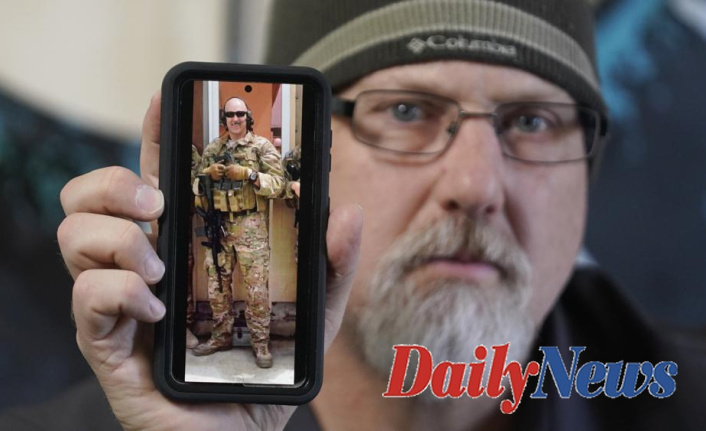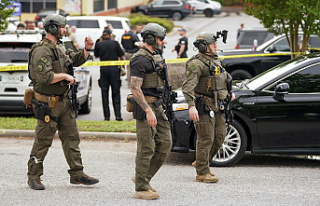Recently retired Green Beret had tried therapy, antidepressants and even a support dog. His arrest for punching holes in the wall of his father after his family attempted to intervene in Utah made it obvious that none of this was working.
He said, "I had a nice home, I had a great career, whatever that was," but he couldn't sleep. He had frequent nightmares, crippling anxieties, and avoided crowds. My life was a mess.
He found psychedelic drugs that he said changed his life. "I was finally able to step back and see the truth. Butler, now 52, said, "I get it now." He is now happily married, and has reconciled with his parents.
Butler, who lives in Salt Lake City's suburbs, is one of many military veterans helping to convince lawmakers to investigate psychedelic mushrooms for therapeutic purposes.
Conservative Utah is now at least the fourth state to have approved the study of the medical use of psychedelics. Federally, they are still illegal. A number of cities have decriminalized magic mushrooms, and a flood of investment money is flooding into the area.
Experts believe the research has promise for treating conditions such as PTSD and quitting smoking. However, there are still serious risks, particularly for people with mental illnesses.
Oregon has been the only state to allow the therapeutic use of certain psychedelic active ingredients in mushrooms, psilocybin. However, the study of these mushrooms for therapy has been successful not only in blue states such as Hawaii, Connecticut, and Maryland but also in GOP-led Texas and Utah, which both passed a study bill through their state Houses this year.
This is in contrast to Utah's refusal to allow medical marijuana until a ballot initiative was passed. The proposal to study a wide range of psychedelic substances passed this year.
Although Texas has not yet legalized medical marijuana, former Republican governor. Rick Perry was instrumental in drafting a bill that authorized the use of $1.4 million for a study on psilocybin to treat PTSD.
"The stigma associated with psilocybin, and most psychedelics, dates back to the 60s & 70s. The bill was sponsored by Alex Dominguez (Democratic Representative). "It was my approach to find the group that all sides support. It would be veterans."
Perry, a conservative who supports the use of psilocybin as a treatment for PTSD, also spoke to him. Let advocates on the other end of the political spectrum speak out publicly.
Maryland also approved $1 million in funding this year for alternative therapies, including psychedelics, to support veterans. Democratic sponsor Senator Sarah Elfreth, whose congressional district includes the U.S. The Naval Academy noted the rise in suicides among veterans.
She stated that she didn't see the VA taking any action soon. "We are at a crisis level, and it is time for the states of America to step up."
Nearby Washington, D.C., as also Denver, has decriminalized Psilocybin. In 2019, it was followed by Oakland, Santa Cruz, Michigan, Ann Arbor, Michigan, Cambridge, Massachusetts.
Venture capital is also being invested by people who have positive experiences and are motivated to invest in psychedelics treatment. John Krystal, Yale University's chair of psychiatry, stated that there is a lot of money available from people who have experienced positive experiences.
Legislators in Rhode Island are considering a proposal to remove psilocybin from the criminal record. In Colorado, there is an attempt to have statewide decriminalization. Similar measures, however, have been blocked in other Statehouses, including California and Maine.
However, the popularity of studying psychedelics has increased. Oklahoma's Republican Representatives Daniel Pae, Logan Phillips and Logan Phillips have introduced a bill that would allow research on psilocybin to be legalized.
Pae stated that he believes the research will prove that the drug can be used safely and responsibly. This could potentially save the lives and health of thousands of Oklahomans. The Senate is currently considering the bill, which passed the House last month.
This is a remarkable turnaround for a field that was once enthralled by researchers in the 1950s- 1960s, long before LSD and mushrooms were considered recreational drugs. Research was halted when they were outlawed by the federal government under Nixon.
However, new studies have shown that psilocybin may be effective in treating everything, including major depression and alcoholism. Ben Lewis, assistant professor of psychology at the University of Utah Huntsman Mental Health Institute, said that the findings are consistent with previous research.
He said, "People refer to this current period as the psychedelic Renaissance." He said that depression sufferers can be as high as 30% resistant to current treatment and that there have been very few advances in drug innovation.
The risk of overdosing or addiction is low when using psychedelics. This is especially true if you are under medical supervision.
However, there are significant psychological risks for those with mental illnesses or family histories of schizophrenia or bipolar disorder.
Albert Garcia-Romeu is an assistant professor at Johns Hopkins University School of Medicine.
LSD, mescaline and psilocybin are some of the most well-known psychedelics. In many indigenous cultures, plant-based psychedelics are used for centuries.
Garcia-Romeu stated that today, Johns Hopkins monitors their therapeutic use. Patients go through a rigorous screening process and usually have three appointments. One is for preparation, one to administer the drugs and one to help with the experience.
Butler's 2018 arrest at his parents home was a turning moment. After being deployed six times to Afghanistan and Iraq, and serving in counterterrorism in Somalia for the U.S. Special Forces, Butler began to look into new ways to manage the PTSD he had suffered. He retired as a lieutenant colonel after 2017.
He eventually discovered ayahuasca. It was a long-standing part of South American traditional cultures. He took part in a ritual involving the psychoactive beverage last summer. It was overseen by a woman who is well-versed in its effects. He felt euphoric, saw geometric shapes, and was able to enter his subconscious, she said.
He spoke to her about his childhood and the impact of the military on his life.
It was as easy as talking to someone who knew the medicine and who understood the subconscious space. He said that it was as easy as listening to her.
He attributes that one session to getting his PTSD under control at around 80%. However, he does occasionally do another session if his symptoms return.
Garcia-Romeu stated that between two-thirds and three-quarters of the people involved in the studies experienced significant improvement in their symptoms. These are encouraging results, especially for those who want to quit smoking. Current treatments only work for around one-third of the population, Garcia-Romeu said.
In 2018, the Food and Drug Administration declared psilocybin "breakthrough therapy". This designation is meant to accelerate the development and review drugs for serious conditions. This designation is also for MDMA, commonly known as ecstasy.
It remains to be seen how quickly states go from being in study to becoming more accessible. The FDA may only approve Connecticut for legal medical use after it has completed its risk assessment. This could take up to 2025.
Approval is crucial for safety and access, according to the Connecticut assessment. Without it, many insurance companies won't likely cover the treatment. This leaves it open to only the wealthy.
The Utah study team is expected finish its work in the autumn.
The bill was sponsored by Republican Rep. Brady Brammer. "If they feel it's safe, it will be an exciting ride.












